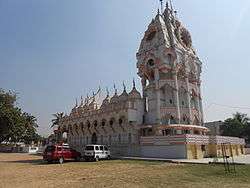Borsad
| Borsad | |
|---|---|
|
Sun Temple, Borsad | |
 Borsad Location in Gujarat, India,Asia. | |
| Coordinates: 22°25′N 72°54′E / 22.42°N 72.9°ECoordinates: 22°25′N 72°54′E / 22.42°N 72.9°E | |
| Country |
|
| State | Gujarat |
| District | Anand |
| Government | |
| • Type | Nagarpalika |
| Elevation | 30 m (100 ft) |
| Population (2001) | |
| • Total | 56,541 |
| Languages | |
| • Official | Gujarati, Hindi, English |
| Time zone | IST (UTC+5:30) |
Borsad is a city and a municipality in Anand district in the state of Gujarat, India. It is located around 17 km from Anand. It is surrounded by the fertile Charotar region which largely produces tobacco, bananas, cotton, barley and other agricultural crops. The Patel community owns majority of business establishments here, most of whom are from the 400 house community that dominates Mahatma Gandhi Gunj Bazar and Janata bazar. Other communities that live in Borsad are Brahmins, Jains, Kshatriya, Muslims and Christians borsad was formed on 2 June
Gandhiji passed through Borsad during the Dandi March satyagrah. Borsad was the seat of the Borsad satyagraha in 1922-23.[1]
Dr. B.R.Ambedkar writes about a negative discriminatory experience of a young Bhangi boy in Borsad in his autobiographical book, Waiting for a Visa (chapter 3).[2]
History
According to a legend Borsad was established as a hamlet by the efforts of a monk in 2nd Century A.D. and remained an important place ever since. It was declared a municipality in 1888 and in 1925, Indian political leader Sardar Vallabhbhai Patel and his allies uncovered evidence suggesting that the police were in league with local dacoits in the Borsad taluka even as the government prepared to levy a major tax for fighting dacoity in the area. More than 6,000 villagers assembled to hear Patel speak and supported the proposed agitation against the tax, which was deemed immoral and unnecessary. Patel organized hundreds of Congressmen, sent instructions and received information from across the district. Every village in the taluka resisted payment of the tax, and through cohesion, also prevented the seizure of property and lands. After a protracted struggle, the government withdrew the tax. Historians believe that one of Patel's key achievements was the building of cohesion and trust amongst the different castes and communities which were divided on socio-economic lines.
Geography
Borsad is located at 22°25′N 72°54′E / 22.42°N 72.9°E.[3] It has an average elevation of 30 metres (98 feet).
Places of Interest
The Borsad Stepwell was built in 1497 by Vasu Soma and his family. It is seven story stepwell and has 13 arches. The water is reached by flight of steps.[4]
Napa Wanto tank was built by Mahmud Begada which has a house in the middle of it. Mahakaleshwar Mahadev temple has enormous Shiva linga.[4]
List of Villages in Borsad Taluka
- Ranoli
- Davol
- Vaghwala
- Bodal
- Bhadran
- Vasna
- Dabhasi
- Bochasan
- Pamol
- Nisaraya
- Vahera
- Kavitha
- Dehmi
- Dhundakuva
- Alarsa
- Zarola
- Vadeli
- sarol
- Vaniyakuva
- klopspura
- Dedarda
- Singlav
- Khanpur
- Virsad
Demographics
As of 2001 India census,[5] Borsad had a population of 96,998. Males constitute 52% of the population and females 48%. Borsad has an average literacy rate of 68%, higher than the national average of 59.5%; with male literacy of 75% and female literacy of 60%. 13% of the population is under 6 years of age.
People
- Ashokpuri Goswami, a Gujarati writer is born here.
References
- ↑ "Sardar Patel : Chronology of events". http://www.sardarpatelaward.com. Retrieved 15 April 2015. External link in
|website=(help) - ↑ Ambedkar, Dr. Bhimrao (1991). Waiting for a Visa (PDF). Mumbai: Dept. of education, Government of Maharashtra. pp. 4071–4090. Retrieved 15 April 2015.
- ↑ Falling Rain Genomics, Inc - Borsad
- 1 2 James Burgess (1885). Lists of the Antiquarian Remains in the Bombay Presidency: With an Appendix of Inscriptions from Gujarat. Government Central Press. pp. 133, 266.
- ↑ "Census of India 2001: Data from the 2001 Census, including cities, villages and towns (Provisional)". Census Commission of India. Archived from the original on 2004-06-16. Retrieved 2008-11-01.
